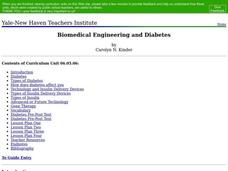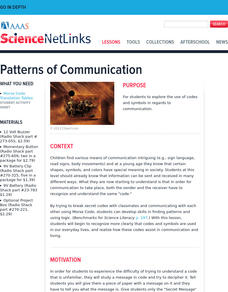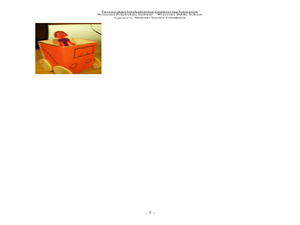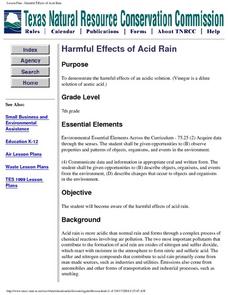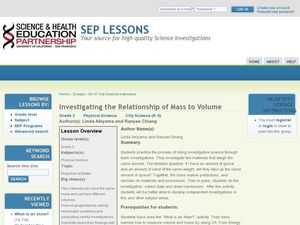Curated OER
Evidence for Evolution
In this evidence of evolution worksheet, students review notes given by referring to the Nelson Biology text, chapter 11/13. Students read the notes and the specified pages in the text.
Curated OER
Love in the Time of Cholera
Learners examine causes and treatment options for cholera. In this biology lesson, students model the osmotic basis of cholera using dialysis tubes. Learners propose treatments for hypothetical patient.
Curated OER
Monarch Migration
Third graders investigate the life cycle of the Monarch butterfly. They experiment with various tools to simulate the mouth parts of insects, conduct research, record their observations of butterflies hatching, write a play, complete...
Curated OER
How Can We Make a Model of Lungs?
Fifth graders examine the function of the lungs and create a model of the lungs. Using a plastic cup, drinking straw, plastic bag, small balloon, and a rubber band, they follow step-by-step directions to construct simulated lungs. ...
Curated OER
National Estuarine Research Reserve System
Learners investigate the benefits of estuarine research reserves. In this National Estuarine Research Reserve lesson plan, students learn how to obtain information on the 26 reserve sites, they discuss the importance of the reserve...
Curated OER
Ethics of Exploration
Students examine space exploration and its domination by governments as well as the fact that some private businesses want to explore space too. They investigate the ethical questions surrounding a space exploration through research and...
Curated OER
Where is the Trail? The Journey of Lewis and Clark
Middle schoolers explore the trail followed by Lewis and Clark on their journey across the United States. In this United States History lesson, students complete several activities to establish the Lewis and Clark Expedition, including a...
Curated OER
Food for Thought
Fifth graders explore the brain and what is needs. In this biology lesson plan, 5th graders will work on a series of activities that will allow them to learn about the brain, its parts, and the best foods to eat for their brain.
Curated OER
Biomedical Engineering and Diabetes
Students discuss diabetes, it causes, and old and current technology to control the disease. They discuss biomedical engineering and new technology to control the disease. The examine the various types of insulin delivery systems and...
Curated OER
"Garden Springs Gardeners"
First graders ponder the question of how plants help their lives. They observe and compare properties of several different plants. Differentiate between living organisms and nonliving objects.
Curated OER
Sorting
Students understand that sorting helps find things at a later date. In this sorting lesson, students use a website game and sort the common items. Students sort folders and other classroom items. Students discuss how sorting helped them...
Curated OER
Building a Car: Mechanical Engineering
Students use common materials to build a car. In this car building mechanical engineering lesson, students build a car using a milk cartoon and plastic wheels. They discuss what mechanical engineers do and what makes a car run.
Curated OER
So You Think You're Tough
Fourth graders learn how to classify animals. In this invertebrates lesson, 4th graders discuss how we classify thinks into groups and move into a discussion about classifying animals. Students learn about the differences between...
Curated OER
Personal Portraits
Students create their own self-portrait or a portrait of someone they know well.
Curated OER
International Festival: France
Students explore French culture. In this cross-curriculum social studies lesson, students listen to Madeline by Ludwig Bemelmans and identify words and landmarks associated with France. Students pronounce several phrases in French,...
Curated OER
Computation: How can we use rice to solve problem questions?
Fourth graders graph metric tons of rice produced by various countries. In this graphing lesson, 4th graders follow problem solving steps to answer questions about rice nutrition and then graph the amount of rice produced by several...
Curated OER
To Protect Your Streams, Protect Your Mountains
Students build and experiment with a watershed to understand the effects of pollution. In this movement of water lesson, students work in groups creating rock formations and change the viscosity of the liquids falling down the mountain....
Curated OER
Find Yourself with Global Positioning
High schoolers examine different types of new mapping technologies. They use the internet to gather information about mapping and navigation. They create their own global positioning tool and defend it to the class.
Curated OER
Archaeological Detectives
Students, in groups, examine in depth one aspect of forensic archaeology to determine the skeleton's age, gender, and possible cause of death. To do so, students must first explain what is involved in each aspect of forensic archaeology.
Curated OER
Harmful Effects of Acid Rain
Seventh graders are able to demonstrate the harmful effects of an acidic solution. They become aware of the harmful effects of acid rain. Students make predictions before they began the experiment. If vingegar contains acid, then how...
Curated OER
Ecological Footprint
Eighth graders discover their own ecological footprint and create a plan for reducing this figure. They extend this to the school and community to see how they are doing on this scale. They discuss the concept of the ecological...
Curated OER
WebQuest Solar System Colonization Project 2000
Sixth graders complete a WebQuest to study the names and locations of the planets in the solar system. They investigate the causes of the seasons and the distance between the planets using astronomical units. They use technology to...
Curated OER
Build the Tallest Building
Students examine the design and construction of skyscrapers. They use the internet to research information about different types of skyscrapers. They create their own building and defend it to the class.
Curated OER
Investigating the Relationship of Mass to Volume
Third graders explore the relationship of mass to volume. In this physical science lesson, 3rd graders participate in an investigation with a several materials and measure the mass and volume using scientific tools. Students discuss and...










